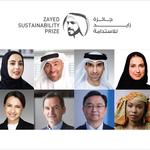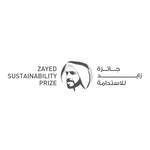30 Finalists announced for Zayed Sustainability Prize 2023
- 10 Winners to be announced at Awards Ceremony in January 2023 across the categories of Health, Food, Energy, Water and Global High Schools
- 4,538 submissions from 152 countries, marking a 13% increase in entries compared to the previous cycle
ABU DHABI, United Arab Emirates–(BUSINESS WIRE)–The Zayed Sustainability Prize, the UAE’s pioneering global award for recognising excellence in sustainability, held its Jury meeting to elect winners for its current 2023 cycle, who will be announced during the Prize’s Awards Ceremony at the 2023 Abu Dhabi Sustainability Week (ADSW), this January.
A total of 30 finalists were confirmed and are now in competition for the 10 awards, across the five categories of Health, Food, Energy, Water, and Global High Schools. This year, the Prize received a record 4,538 applications, marking a 13% increase in entries compared to the previous cycle, while attracting submissions from 152 countries.
The Prize Jury, comprising former heads of state, UAE government ministers, and international business figures, met in Abu Dhabi in October to review the shortlisted submissions identified by the Prize’s Selection Committee.
Remarking on the announcement of the finalists, H.E. Dr. Sultan Ahmed Al Jaber, UAE Minister of Industry and Advanced Technology and Director General of the Zayed Sustainability Prize, said: “The late Sheikh Zayed bin Sultan Al Nahyan instilled in the UAE a commitment to inclusive sustainable and humanitarian development, and the Zayed Sustainability Prize continues to honour his legacy by turning this commitment into action. For the past 14 years, the Prize has accelerated the deployment of practical yet sustainable solutions that have positively transformed the lives of over 370 million people.”
“The Zayed Sustainability Prize has played an important role in supporting the UAE’s vision to drive inclusive climate action. The Prize will continue to amplify the UAE’s track record of supporting sustainable innovation across the world and driving progress toward empowering entities and schools who are contributing to global development,” he added.
Many of this year’s finalists proposed sustainable solutions that tackle environmental issues while also empowering local community members by unlocking their entrepreneurial potential. Many of those solutions leverage next generation technologies such as Artificial Intelligence (AI) and the Internet of Things (IoT) to drive impact.
The Chair of the Jury and former President of the Republic of Iceland, H.E. Ólafur Ragnar Grímsson, added: “The diverse range of innovations demonstrated in this year’s applications, including inspiring projects envisioned by the youth, reflects the Prize’s continuous ability to bring out the world’s sustainability pioneers by offering them a unique platform for driving transformational change.”
Health finalists focused on providing specialised medical care to remote communities.
The ‘Health’ category finalists are
- Associação Expedicionários da Saúde (Brazil), an NPO that provides specialised medical and surgical care for indigenous communities geographically isolated within the Amazon through its Mobile Hospital Complex.
- Helmholtz Centre for Infection Research (Germany), an NPO that developed the Surveillance Outbreak Response Management and Analysis System, an open-source digital platform for early detection of disease outbreaks and epidemic control management.
- Ory Laboratory (Japan), an SME that developed the robot, OriHime, designed for people with disabilities to reduce social isolation and provide them the opportunity to work and connect with society.
Food finalists focused on transforming small farmers into entrepreneurs with improved agricultural productivity, either through innovative business models or advanced technologies.
The ‘Food’ finalists are:
- Nuru International (USA), an NPO that helps farmers in Africa transition from subsistence farming to farmer-owned and farmer-led cooperative agribusiness, tailoring their capacity development activities to existing efforts by government agencies and adapting to the local context.
- Sanergy (Kenya), an SME that combats issues of high farm input prices, low availability of supplies, and declining soil fertility faced by Sub-Saharan African farmers by manufacturing organic fertiliser and insect protein from diverse waste streams.
- Ynsect (France), an SME that produces insect protein and natural insect fertilisers, with Europe’s first of its kind insect factory equipped with innovative vertical farming and integrated biorefining setup.
Energy finalists focused on extending clean energy access to vulnerable communities while also introducing new business models that promote a gender-inclusive clean energy sector and generate socioeconomic opportunities.
The ‘Energy’ category finalists are:
- Green Girls Organisation (Cameroon), an NPO that uses patented algorithms to identify areas where women and girls can benefit from energy access, and then deploys decentralised solar PV and biogas systems in identified areas for lighting and clean cooking.
- NeuroTech (Jordan), an SME that developed Al-based algorithms with a blockchain-based transaction system to bring reliable energy access to refugee camps.
- Solarkiosk Solutions GmbH (Germany), an SME that developed the “E-HUBB” and the Connected Solar Market Center “THE PULSE” to empower local farmers and micro-businesses with renewable energy for productive use.
Water finalists focused on affordable solutions to make safe drinking water and sanitation more accessible in last-mile communities.
The ‘Water’ category finalists are:
- HELIOZ – WADI (Australia), an SME that deploys a solar-powered device that informs people when water is safe to drink – a method that reduces CO2 emissions and indoor air pollution.
- LEDARS (Bangladesh), an NPO that integrates water resource management models to solve water scarcity issues in disaster-prone areas where water becomes unusable due to salinity and flooding.
- Seisui Industries Inc. (Japan), an SME that developed a movable wastewater treatment plant which can be customised as per needs and deployed when and where it’s needed.
The Global High Schools’ finalists presented project-based, student-led sustainability solutions, with finalists divided into 6 regions. The regional finalists include:
The Americas: Centro Etnoeducativo Integral Rural Nuestra Señora del Carmen (Colombia), Escuela Técnica Nro.3 Maria Sanchez de Thompson (Argentina), and Fundacion Bios Terrae – ICAM Ubate (Colombia).
Europe & Central Asia: ES Kreativno pero (Serbia), Northfleet Technology College (United Kingdom), and Romain-Rolland Gymnasium (Germany).
Middle East & North Africa: Gifted Students School (Iraq), JSS Private School (UAE), and Obour STEM School (Egypt).
Sub-Saharan Africa: Cheshire High School (Nigeria), Mary Mount Secondary School (Kenya), and UWC East Africa – Arusha Campus (Tanzania).
South Asia: Dhaka Residential Model College (Bangladesh), Kopila Valley School (Nepal), and Obhizatrik School (Bangladesh).
East Asia & Pacific: Bohol Wisdom School (The Philippines), Kamil Muslim College (Fiji), and Sangam Sadhu Kuppuswamy Memorial College (Fiji).
In the Health, Food, Energy, and Water categories, each winner receives US$600,000. The Global High Schools category has six winners, representing six world regions, with each winner receiving up to US$100,000. Since its launch in 2008, the US$3 million Prize has, directly and indirectly, transformed the lives of over 370 million people across 150 countries. Today, the Prize remains a catalyst for addressing the world’s most pressing issues as it continues to drive and deliver long-term impact to various communities around the world.
About the Zayed Sustainability Prize
The Zayed Sustainability Prize is the UAE’s pioneering global award in sustainability and a tribute to the legacy of the late founding father of the UAE, Sheikh Zayed bin Sultan Al Nahyan. Established in 2008, the Zayed Sustainability Prize aims to drive sustainable development and humanitarian action by recognising and rewarding small and medium-sized enterprises, nonprofit organisations, and high schools that are delivering impactful, innovative and inspiring solutions in the categories of Health, Food, Energy, Water and Global High Schools.
Through its 96 winners, the Prize has positively impacted the lives of 370 million people around the world.
*Source: AETOSWire
Contacts
Reem Diab
Reem.Diab@bcw-global.com




